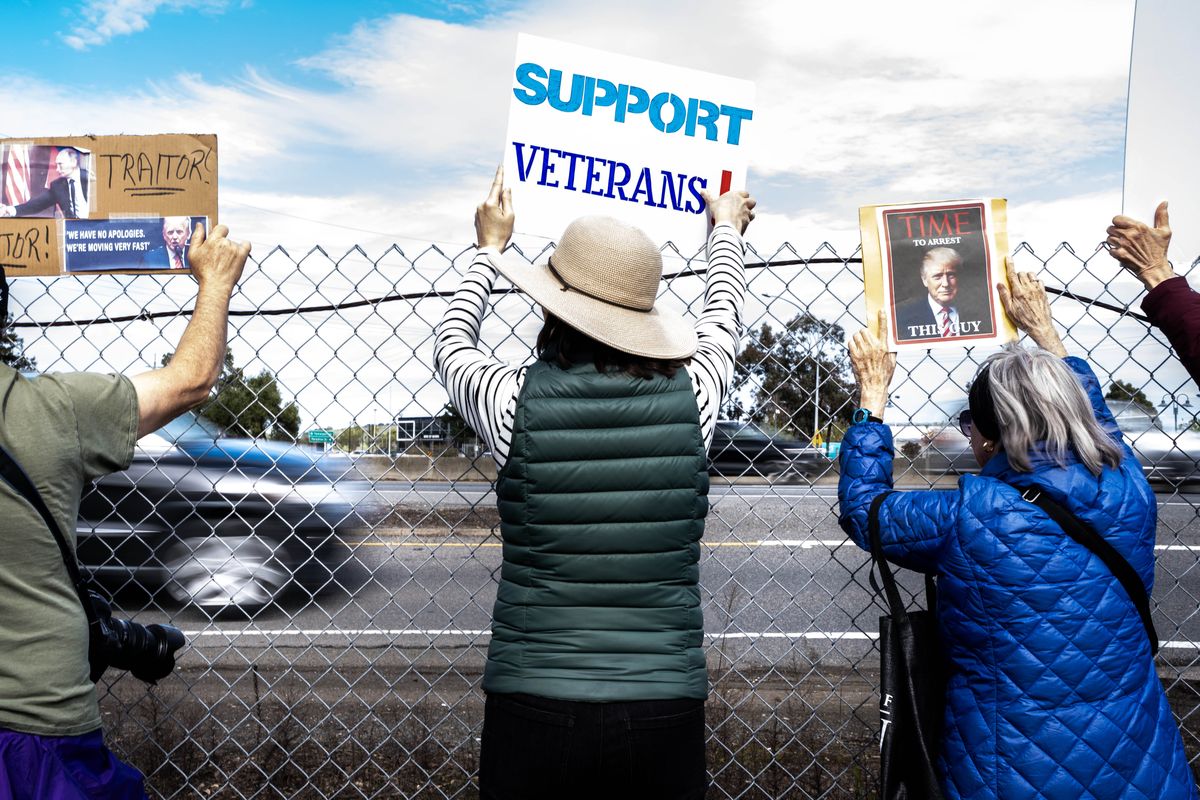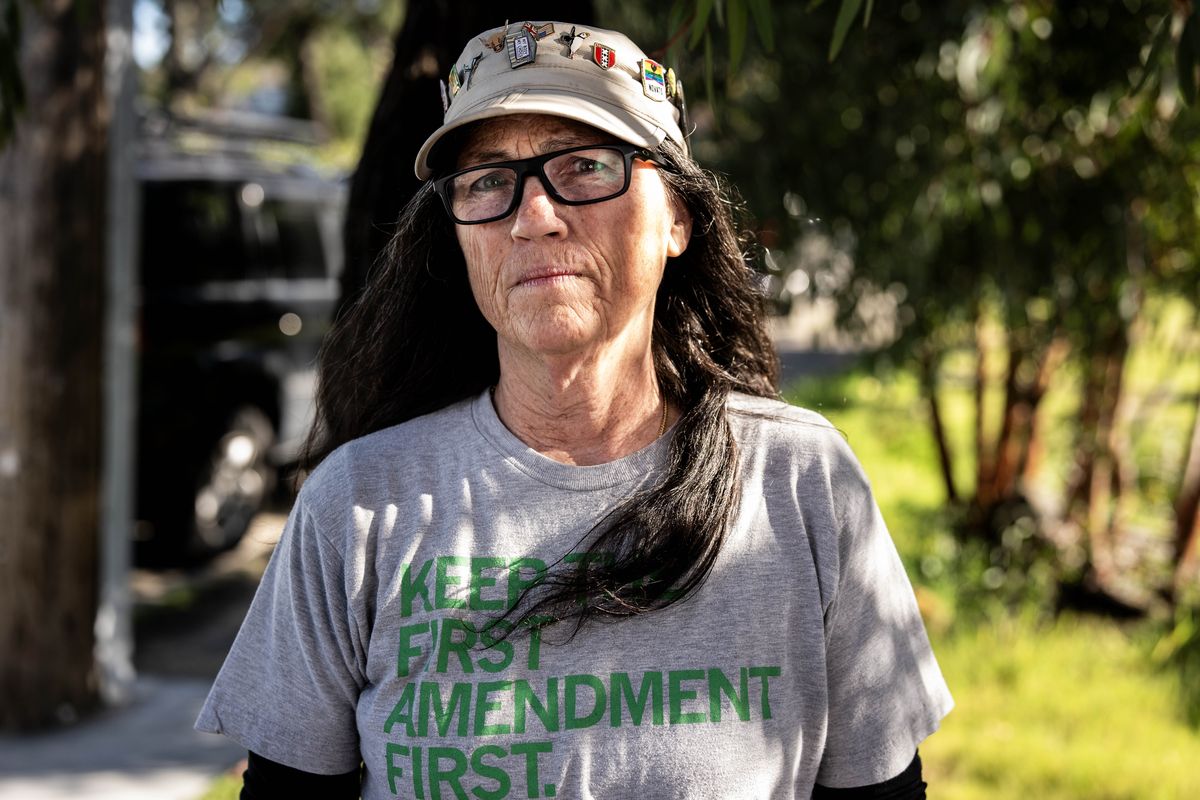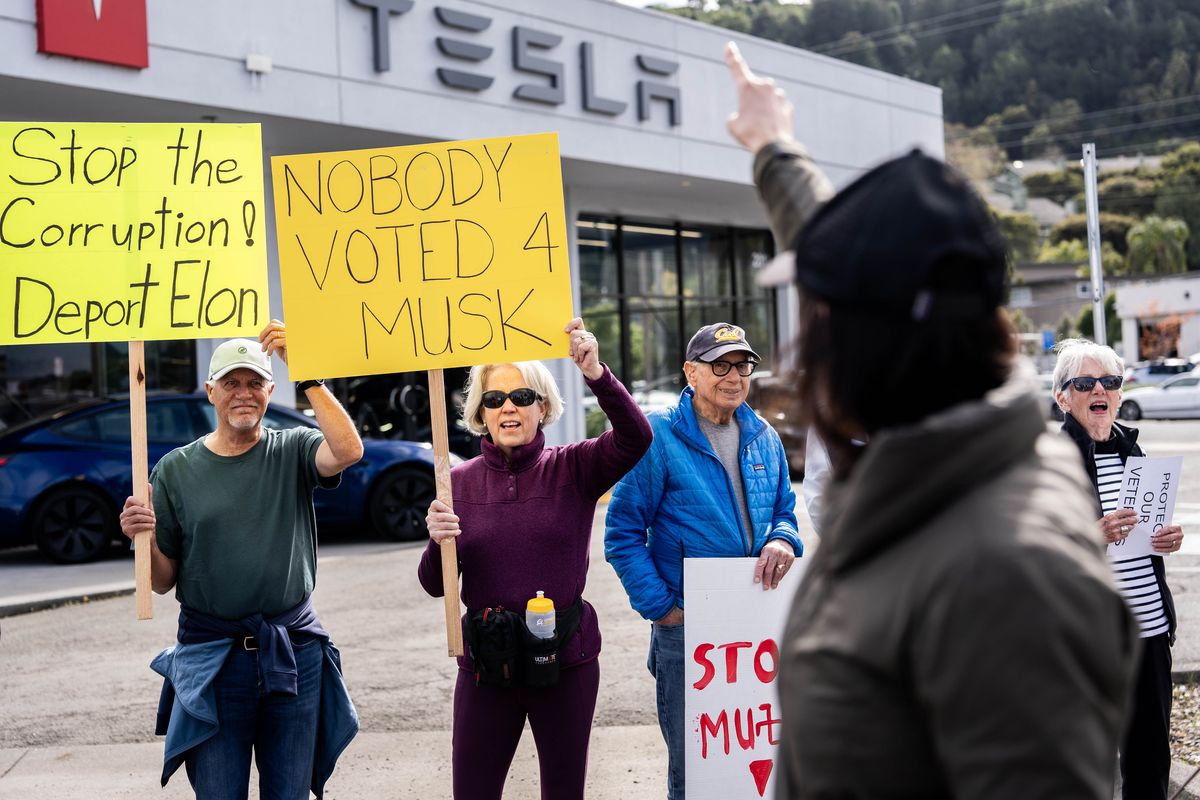The anti-Trump movement has found its target: Elon Musk’s Tesla
Protesters organized by the “Tesla Takedown” movement gather outside a Tesla dealership on Saturday near Highway 101 in Corte Madera, Calif. (Melina Mara/Washington Post)
Jennifer Cousins has a laundry list of grievances against President Donald Trump: the dismantling of the Department of Education, the administration’s anti-transgender policy, and deep cuts to the Social Security Administration.
The 48-year-old Florida resident was unsure where to direct her ire. But an obvious outlet has emerged: Elon Musk’s Tesla.
“Musk is a bigger threat to democracy than Trump is at this point,” said Cousins, a longtime activist who organized an anti-Tesla rally in a deep-red district in Central Florida last weekend, drawing about 100 people. “The goal is to make him broke.”
Musk has become the most polarizing figure of Trump’s second term, overseeing dramatic cuts and sweeping layoffs within the federal government through his U.S. DOGE Service. As public sentiment toward Musk has curdled, activists have taken aim at the electric-vehicle company that undergirds much of the billionaire’s wealth – transforming Tesla into the symbol of a new anti-Trump movement.
A groundswell of Tesla protests has erupted across the globe, many launched by groups that have emerged in recent months. Activists created “Tesla Takedown,” a clearinghouse for smaller protests, earlier this year. Rise and Resist, a social advocacy group started in 2016 during Trump’s first administration, now focuses on anti-Tesla action, offering a tool kit for organizing protests at Tesla showrooms. On Saturday, protesters will gather at dozens of Tesla dealerships as part of a global day intended “to stop Musk’s illegal coup.”
This anti-Tesla sentiment has spread online, inspiring videos of people defacing Teslas with spray paint, eggs and keys, and in one viral post, Mardi Gras revelers throwing beads and alcohol at a Cybertruck during a parade. Cousins said those attacking Tesla vehicles and the company’s properties are “not the same people we are rallying with,” and she does not condone the violence.
Still, the singular focus on Tesla – a brand that built its popularity largely through liberal customers concerned about climate change – is a shift from Trump’s first term, when unrest scattered across issue-specific events, including the Women’s March, demonstrations against the president’s “Muslim ban,” and pro-science rallies.
But in Tesla, activists have found a catchall for an array of political grievances – and a rare chance to trace impact directly, through sinking car sales and company stock. Although Tesla’s stock has risen slightly in recent days, it has fallen by nearly 30% since Trump’s inauguration. Tesla owners are also trading in their vehicles at an increasing rate and prices for used Teslas have sunk.
“The Tesla dealership is a godsend for activists,” said David S. Meyer, a professor of sociology and an expert in social movements at the University of California at Irvine. “You can see them. They’re tightly, tightly associated with Musk … (and) it’s a place where people can assemble.”
Musk and Tesla did not respond to a request for comment.
Cousins was thrilled at the popularity of the rally she hosted in Clermont, Florida, where more than 60% of residents voted for Trump. As the movement gains steam, Cousins said she has been finding great satisfaction in checking Tesla’s stock price.
“The stock has been steadily falling. And it can’t just be from people being mad and shouting at their TV screens,” Cousins said. “This has to be the result of direct action being taken against this megalomaniac oligarch who nobody elected.”
‘Let this be a warning’
Tesla was already struggling at the beginning of the year, but analysts and shareholders are increasingly concerned that the sustained demonstrations are causing significant harm to the stock. Dan Ives, a senior analyst at Wedbush Securities, said Tesla is in a “dark brand crisis tornado” calling on Musk to re-engage with the company.
“Musk and Tesla have become a political symbol which has been a major overhang on the stock,” he wrote in an investors note.
Trump – whose hotel business also took a hit amid the unrest of his first term – has attempted to summon a wave of conservatives to the rescue. The president showcased a string of Teslas on the White House lawn this month, while Commerce Secretary Howard Lutnick urged Fox News viewers last week to buy Tesla stock – an apparent violation of federal ethics rules that prohibit executive branch officials from endorsing products or businesses.
Musk has claimed without clear evidence that Tesla protests are coordinated, accusing ActBlue, a Democratic fundraising tool, of funding anti-Tesla activist organizations. Two of the five organizations Musk listed do not raise money using the tool, according to a Post review. ActBlue states on its website that it operates as a “conduit” for raising funds, and it doesn’t “fundraise, donate, or send texts or emails on behalf of any group.” ActBlue did not respond to an additional request for comment.
In an all-hands this month, Musk denounced the widespread unrest against his company, calling images of burning Teslas “Armageddon.”
“It’s like, I can’t walk past the TV without seeing a Tesla on fire. Like, what’s going on?” Musk said in the meeting, which was live-streamed on X, the social media platform he owns. “This is psycho, stop being psycho!”
Although the majority of demonstrations have been peaceful, some attackers have lit charging stations on fire, destroyed vehicles with molotov cocktails, vandalized storefronts and shot bullets though showroom windows. Trump has seized on these incidents, calling them acts of “domestic terrorism,” and the FBI launched a task force this week to investigate the suspects.
Attorney General Pam Bondi announced charges last week against three people behind violent acts against Tesla, involving molotov cocktails and gunfire. “Let this be a warning: if you join this wave of domestic terrorism against Tesla properties, the Department of Justice will put you behind bars,” she said in a statement.
Meanwhile, peaceful protests are increasingly being met with force.
On Saturday, a man sped his car into a group of protesters standing outside a Tesla dealership in Palm Beach, Florida – roughly eight miles west of Mar-a-Lago. No one was injured, said Teri Barbera, a spokeswoman for the Palm Beach County Sheriff’s Office. That same day, a counterprotester brandished a stun gun at a gathering outside a Tesla showroom in Berkeley, California, according to Jessica Perry, a spokeswoman for the Berkeley Police Department.
From pink hats to staring down Tesla drivers
During a protest in Northern California this month, Patty Hoyt stood peacefully at the entrance of a Tesla dealership with a dozen others, holding signs that said “Sell or Sieg Heil” and “Boycott Tesla.” When a Tesla pulled up to the dealership’s service station, she took off her sunglasses and stared the driver down.
“My signs are meant to shame people,” said Hoyt, 63, who organized the protest in Corte Madera, California.
“Musk is the guy who wants to (ruin) everything that is good with America, so I would like to (ruin) his company.”
A longtime activist, Hoyt flew to Washington during Trump’s first inauguration for the Women’s March, where hundreds of thousands of women wore pink knitted hats to protested the president. She organized protests across Northern California during Trump’s first term, rallying against Brett M. Kavanaugh’s Supreme Court nomination and immigration and education issues.
While the marches served as a powerful place for Hoyt to channel her grief and rage, she said the Tesla protests are attracting a much “broader swath of people.” She has met veterans at her rallies motivated by DOGE’s cuts to veterans services. Some had last attended a protest in the 1960s to object to the Vietnam War.
The diversity of the attendees reflects Musk’s widespread impact: “He is hurting everybody,” she said.
As images of massive protests and defaced Teslas go viral online, demonstrations have also mushroomed around the world with an aim of stigmatizing the billionaire’s brand.
After Musk twice made a gesture that resembled a Nazi salute on Inauguration Day and supported far-right British extremist Tommy Robinson, a group of British activists formed the group “Everyone Hates Elon.”
The group organizes guerilla-style protests across the United Kingdom, attempting to use humor and legally questionable tactics to criticize Musk. They have placed stickers on parked Teslas that read, “Don’t Buy a Swasticar,” and have hacked into London bus stop displays to post their own ads. Featuring photos of Musk and Tesla cars, the ads say: “Autopilot for your car. Autocrat for your country,” and another using a British slur for male genitalia.
Transport For London, a transit body for the city, said in early March that train and bus stop ads likening Musk to a Nazi are “not authorized” and pledged to take them down.
Ed Niedermeyer, author of “Ludicrous: The Unvarnished Story of Tesla Motors,” who is organizing “Tesla Takedown” rallies in Oregon, said people are motivated by the idea of targeting a company because they can feel a tangible difference when they watch the stock drop or hear about people selling their vehicles.
“We are using economics and the vulnerability of Tesla to exert pressure,” he said. “The one lever we have to effect this situation is Tesla’s vulnerability.”


